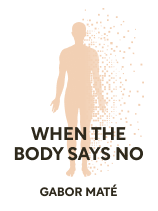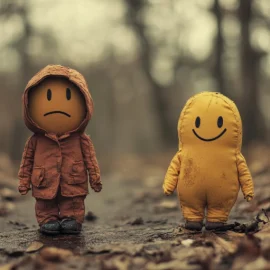

This article is an excerpt from the Shortform book guide to "When the Body Says No" by Gabor Maté. Shortform has the world's best summaries and analyses of books you should be reading.
Like this article? Sign up for a free trial here .
What are the main causes of chronic stress? How can childhood stress lead to diseases later in life? Does personality play a role in development of physical disease?
In his book When the Body Says No, Dr. Gabor Maté says that there is a link between chronic stress and physical illness. According to Maté, chronic stress often stems from childhood, meaning that one’s parental nurturing, childhood development, and even personality may contribute to development of certain illnesses later in life.
Learn about the ultimate cause of chronic stress, according to Dr. Gabor Maté.
Ultimate Causes of Disease
Considering the links that have been observed between some diseases and stress, personality, and life experiences, Maté argues that there are clearly contributing causes beyond the biological. He says that doctors often look primarily for “proximate” causes but fail to look for “ultimate” causes. Proximate causes include the immediate observable causes, while ultimate causes are the bigger-picture explanations.
In his book, Maté is looking for the ultimate cause of disease in the psychology of the human host. In this article, we’ll look at the childhood causes of chronic stress. You’ll learn what kinds of parent-child relationships contribute to these experiences in children, and how modern society creates the conditions for these parenting patterns. You’ll also see why Maté says that nobody is to blame for this, so assigning blame is meaningless.
| Integration of Traditional and Modern Medicine Anthropologist Hank Wesselman says that within shamanic traditions, physical illnesses are the effects of disease, while “the ultimate causes of virtually all illnesses are to be found within the imaginal realm.” Thus, treating illness with medications only simply alleviates symptoms without addressing the cause. He identifies three causes of illness, from the traditional shamanic perspective: – Disharmony: This is when a person finds themself in a state where they have lost some amount of purpose, meaning, or connection in life. For example, when a person loses a loved one or has a dysfunctional relationship. – Fear: living with chronic anxiety – Soul Loss: This is considered the most serious diagnosis, and is what we might think of as severe depression resulting from trauma. When a person has essentially lost the will to live, traditional cultures would say that they’ve “lost their soul.” Considering this traditional view in light of the research we now have on the stress-disease connection, we can see why some Western medical practitioners, including Gabor Maté, are beginning to see the importance of learning from indigenous cultures and integrating traditional and modern medicine for a more holistic approach to healing. |
Self vs. Other: Differentiation
One of the areas where childhood development can go awry is in the process of differentiation. Maté explains that humans are naturally meant to develop from a state of total dependence toward an interdependent independence—meaning we should develop our own sense of self as separate from others and be able to self-regulate our emotions, but also have interdependent supportive relationships. Any dysfunction in the parent-child relationship, Maté says, can cause problems with the internal processes that regulate the child’s survival mechanism. This can result in the individual staying too dependent on others and not learning to self-regulate, or becoming too independent and not developing supportive relationships.
(Shortform note: Hyper-independence may be encouraged in particularly individualistic cultures. This means that if a dysfunctional parent-child relationship results in poor individuation, a child’s tendency to overcompensate with hyper-independence may be consistently rewarded throughout their life in such a culture. In a collectivist culture, since hyper-independent behavior is frowned upon, such a person may tend more toward hyper-reliance on others, or “learned helplessness.”)
Parental Nurturing
Another dynamic that can cause stress-related developmental problems in children is the amount of nurturing affection given by the parent to the child. Maté says that in addition to feeling safe as children, we also need to feel loved.
Maté explains that almost 90% of brain development takes place in the first few years of a child’s life, and this development is a product of inherited genetic factors and environmental conditions. He says that loving emotional interaction with a parent, or the lack thereof, affects the release of hormones, and the amount and balance of those hormones affect brain development. When a child’s brain is not getting consistent messages of love and nurturing, it develops in such a way that it can’t correctly distinguish between threats and non-threats. This is why physical touch by the mother is important for proper development in all mammals and crucial for humans to be able to develop healthy relationships. Research on premature babies, Maté says, shows how powerfully affectionate touch impacts development.
| The Effects of Early Child Psychology Perhaps one of the most destructive trends in causing an intergenerational dysfunction in child-parent bonding was the child psychology advice that became prominent in the late 19th and early 20th centuries. A number of pioneers in the field believed that mothers shouldn’t show affection to infants, that babies’ cries should be ignored, that they shouldn’t be held, and that corporal punishment was necessary for raising well-behaved children. American behavioral psychologist John B. Watson wrote a book called Psychological Care of Infant and Child in 1928, in which he called motherly love “a dangerous instrument” that would result in disastrous effects on children and on their life chances in adulthood. He advocated for never kissing, hugging, or giving any affectionate touch to children. Although contemporary psychologists consider this advice to be patently wrong, its widespread influence (coming from “experts” in the field) may have had devastating effects on American and European cultures that continue to be unconsciously passed down through the generations in parenting patterns today. |
Maté points out here that it’s not only abuse and trauma that cause stress-related illness— some people have the same stress problem not because of what was done to them, but because of what was withheld from them. Children don’t just need physical touch, affection, and safety; they also need “attunement,” which means a parent being “tuned in” to the child’s needs. Even parents who really love their children, and whose children know they’re loved, are sometimes lacking attunement, Maté says.
| Attunement Is Emotional and Physiological The Body Keeps the Score gives further insight into the issue of attunement. In this book, Bessel van der Kolk explains that when a baby’s needs and distress are consistently attended to and soothed by a caregiver, they grow to understand that they’re in a relatively safe world where threats can be resolved, and they’ll ultimately learn to resolve those situations for themselves. Children who are neglected, however, will be unable to effectively manage their own distress throughout life and will become adults who become overwhelmed and give up in the face of difficulty. He also says that attunement has both an emotional and a physical component. When the parent is emotionally attuned and physically present, the child’s distress can be soothed by the calm physical presence of the parent, and their own bodies will respond physiologically with lowering stress hormone levels, slowing the heart rate, and calming the breath. |
Personality vs. Positionality
Beyond early childhood development dynamics, there are also situational factors in families and societies that can lead to individuals adopting certain personality characteristics that are correlated with chronic stress. We’ve seen that some personality traits do contribute to greater stress. But Maté explains that these personality traits aren’t simply individual attributes; they are a result of larger family dynamics–our “position” in a multigenerational family–and those families are positioned within a culture and society.
Maté points out that changes in social structure due to modernity have destroyed much of the foundational social connections humans evolved with. Previous humans lived in extended families and communities with multiple nurturing adults caring for children. Now, he says, with nuclear families and the socioeconomic structure (particularly in capitalist societies), parents have to work while children are put into daycare and schools separated from extended family. Hence, many of the diseases discussed here, Maté says, are products of more recent civilization.
| Diseases of Modernity Sociologist David Matthews analyzes the relationship between modern capitalism and mental health, noting that among monopoly-capitalist nations today, “mental-health disorders are the leading cause of life expectancy decline behind cardiovascular disease and cancer.” He points out that such nations also tend to take a purely biomedical approach to mental illness, such as the “chemical imbalance” theory often espoused in psychiatry. However, this approach doesn’t consider the way the modern lifestyle affects mental health. As underlying causes of mental health decline, he points to such cultural norms as: emphasis on materialism, high degree of social inequality and oppression, social alienation and loneliness, overemphasis on work and repression of creativity, and denial of our innate human natures. |
Removing Blame
In light of the strong connection between parenting dynamics, personality traits, and chronic stress, we might naturally conclude that parents are to blame for their children’s illness. Maté also points out that he has received criticism for his theories based on the accusation that pointing out the connection between individuals’ personality traits and their disease is “blaming the victim.” However, Maté says recognizing that illness may be caused in part by a person’s psychological state, personality traits, or environment is not “blaming the victim.” Rather, he says pointing out that the person may actually be able to do something about it empowers them to take responsibility for their own health.
Additionally, Maté says that there is no call for blaming our parents, or for blaming ourselves for our children’s illnesses. After all, the parent’s brain developed in response to their own childhood relationship with their parents.
| From Victimhood to Empowerment Psychologists point out that it’s important for victims of trauma and abuse to reframe their experience from one of victimhood to one of empowerment. This involves confronting the struggles with self-esteem and helplessness they’ve acquired as victims, and learning to believe they have the ability to determine what happens to them in the future. One approach to this is logotherapy, developed by Holocaust survivor Viktor Frankl. Logotherapy involves helping the trauma survivor find a new sense of meaning and purpose in life using the Socratic method of philosophical inquiry. Through a series of questions, the patient is able to reimagine their life’s purpose in a way that empowers them to move beyond the trauma. |

———End of Preview———
Like what you just read? Read the rest of the world's best book summary and analysis of Gabor Maté's "When the Body Says No" at Shortform .
Here's what you'll find in our full When the Body Says No summary :
- How stress can manifest as chronic illness
- How to heal from and avoid stress-related diseases
- Why toxic positivity can make you sick






